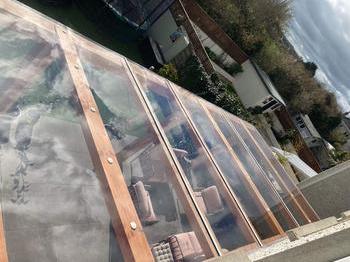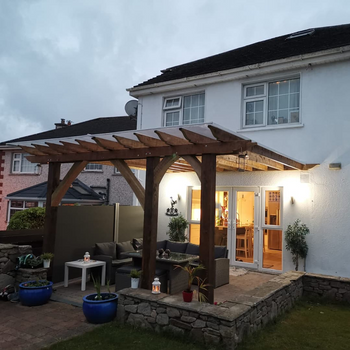*Sponsored content from Plastic Solutions.
When it comes to garden glazing projects, glass has always been the go-to material. For centuries glass has endured as the mainstay of all our glazing requirements. However, this can be mainly attributed to a lack of alternatives.
This is no longer the case. Polycarbonate has the optical performance of glass but without many of its drawbacks. Let’s have a look at polycarbonate glazing and discuss why it should be a consideration for your garden glazing projects.
Features and benefits of polycarbonate glazing

To understand the benefits of polycarbonate glazing, it is a useful exercise to compare it to traditional glazing. Glass has been with us for centuries despite its inherent vulnerabilities.
Glass can be fragile, heavy, and less efficient in terms of insulation. This is where polycarbonate glazing comes into play, offering a modern, more resilient alternative.
Let’s compare some of the factors that can help you decide between traditional glass and polycarbonate glazing:
- Durability: The saying goes that people who live in glasshouses shouldn’t throw stones. With over 200 times the impact resistance of glass, the same charge cannot be levelled at people who live in polycarbonate houses!
- Easy Installation: When it comes to handling and installing, polycarbonate glazing wins hands down. It is lighter than similar grades of traditional glass and easier to work with and install. Polycarbonate also has flexibility for curved surfaces, and you can also cut and drill polycarbonate on-site.
- Light transmission: Polycarbonate glazing has light transmission properties similar to that of glass. This makes it a perfect choice for garden projects like greenhouses, where maximising sunlight is essential for plant growth. Some Polycarbonate glazing options also offer UV protection. While glass transmits 50% of UV radiation, these polycarbonate sheets block 99.99%.
- Energy efficiency: With soaring energy prices and the move to a more sustainable lifestyle, energy efficiency is a prime concern for many homeowners. Polycarbonate glazing excels in this area. Its insulating properties are superior to traditional glass.
- Versatility: Polycarbonate sheeting is available in a range of thicknesses, types (solid and multiwall), and colours. Whether you are looking for clear sheets for a greenhouse or a tinted finish to add some shade, the versatility of polycarbonate sheeting means there is a perfect option.
Overall, the benefits of polycarbonate, when compared to glass, are manyfold. It is more robust, easier to work with, and versatile enough to be used in any garden glazing project.
Applications of polycarbonate glazing in garden spaces

Here are some examples of where polycarbonate glazing can be utilised in your garden:
- Gazebos and pergolas: Weather-resistant outdoor spaces can be enhanced by incorporating the light transmission and insulation properties of polycarbonate into your gazebo or pergola. You can see here all you need for your lean-to pergola.
- Cold frames: Polycarbonate is the perfect material if you’re a gardener wanting to extend the growing season. Again, it is the mixture of the core properties of superb light transmission, impact resistance, and insulation properties that make this the perfect material.
- Greenhouses: One of the most common uses of polycarbonate glazing is in greenhouses. The strength, light transmission, and thermal properties of polycarbonate glazing make it perfect for garden greenhouses.
This represents only a few of the wide range of uses that polycarbonate glazing can be used for in gardens and garden spaces.
Polycarbonate glazing: A crystal-clear choice for garden spaces

No longer is there just a single choice when it comes to garden glazing projects. The properties of polycarbonate glazing make it a cost-effective and robust alternative that outshines glass in many metrics.
Before you set out to revamp that greenhouse or renovate that old gazebo, it is worth taking a little time to consider the glazing alternatives. You may just be surprised by the benefits that polycarbonate glazing can bring to your project.
*Disclaimer: This blog post is sponsored content, which is independent of the FMB. Publication does not constitute endorsement or recommendation from the FMB.

